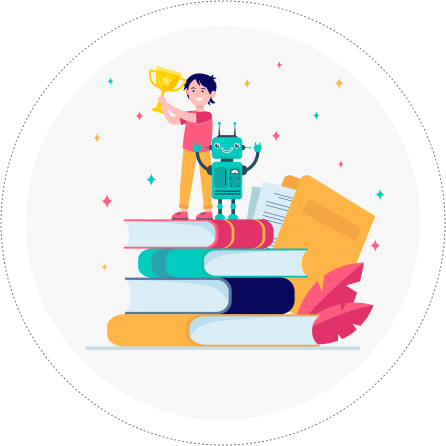Information Technology Class 10
- Home
- / Python Handay
- / Information Technology Class 10
Welcome!
In Information Technology for Class 9, students learn essential IT skills such as IT-ITeS industry basics, data entry, keyboarding, digital documentation, spreadsheets, and presentations. The course focuses on practical technology use in daily life and future careers. The exam is 100 marks, with 50 marks for theory and 50 marks for practicals. The paper has four sections: 1) Employability Skills, 2) Subject-Specific Skills, 3) Practical Work, and 4) Project Work
Prerequisites
The prerequisites for learning Information Technology in Class 10 include basic computer knowledge, familiarity with typing and using digital tools, an understanding of the internet, and a general interest in technology. No advanced skills are required, just curiosity and willingness to learn.
Learning Objectives
The learning objective of Information Technology to develop students’ digital literacy, enhance their practical IT skills, and familiarize them with essential tools like digital documentation, spreadsheets, and presentations for effective use in daily life and future careers.
Course Overview
1.Communication Skills-II
- Advanced verbal and written communication techniques.
- Public speaking and presentation skills.
- Effective feedback and active listening strategies.
- Cross-cultural communication and etiquette.
2: Self-Management Skills-II
- Goal setting and time management techniques.
- Stress management and resilience building.
- Personal branding and self-presentation.
- Decision-making and problem-solving skills.
3: Information and Communication Technology Skills-II
- Advanced computer operations and software applications.
- Online collaboration tools and project management.
- Cybersecurity and safe internet practices.
- Digital communication tools and platforms.
4: Entrepreneurial Skills-II
- Business planning and market analysis.
- Financial literacy and budgeting for entrepreneurs.
- Networking and relationship-building skills.
- Innovation and creativity in business.
5: Green Skills-II
- Sustainable practices in business and daily life.
- Importance of biodiversity and conservation.
- Environmental policies and regulations.
- Community involvement in environmental initiatives.
1: Digital Documentation (Advanced) – Using LibreOffice Writer
- Advanced Formatting Techniques.
- Working with Tables and Charts
- Advanced Tools
- Mail Merge
- Inserting Media Elements
2: Electronic Spreadsheet (Advanced) – Using LibreOffice Calc
- Advanced Formulas and Functions.
- Data Analysis Tools
- Charts and Graphs
- Conditional Formatting
- Macros
Unit 3: Database Management System – Using LibreOffice Base
- Introduction to Database
- Creating and Managing Tables
- Queries
- Forms and Reports
- Data Integrity and Security
Unit 4: Maintain Healthy, Safe, and Secure Working Environment
- Workplace Safety
- Health and Well-being
- Fire Safety and First Aid
- Cybersecurity
- Waste Management
- Digital Documentation (Advanced) using LibreOffice Writer 5 Marks
- Electronic Spreadsheet (Advanced) using LibreOffice Calc 5 Marks
- Database Management System using LibreOffice Base 10 Marks
- Viva Voce 10 Marks
PROJECT WORK/FIELD VISIT: 10 Marks
PORTFOLIO/ PRACTICAL FILE: 10 Marks
Enquiry Now
Our Courses
Data Analyst using Python
Select Tech MindGuru for Why ?
Placement Assistance
Placement assistance offered for a successful career.
Membership
Membership provided until the final examination.
Personalized Attention
Personalized attention provided to each student.

Get Course Certificate
Certificate awarded upon completion of the course.
Monthly Tests
Regular monthly test series for progress evaluation.
Latest CBSE Syllabus
Training modules aligned with the latest CBSE syllabus.
Frequently Asked Questions
The syllabus includes IT-ITeS basics, data entry, keyboarding, digital documentation, spreadsheet management, and digital presentations.
The course is assessed through a 100-mark paper, divided into 50 marks for theory and 50 marks for practical work.
Basic computer knowledge and an interest in technology are recommended but not required.
Practical sessions involve hands-on activities using software tools for tasks like spreadsheets and presentations.
Yes, students complete a project or field visit as part of their assessment.
Students will develop digital literacy, problem-solving skills, and the ability to use technology effectively in everyday tasks.


